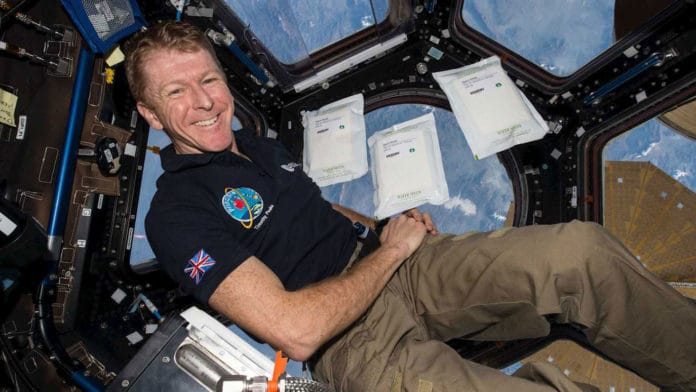In the ‘Rocket Science’ project, scientists from Royal Holloway sent salad rocket seeds into space, with the futuristic concept of one day being able to live on another world.
They sent 2kg of rocket seeds to outer space on the International Space Station (ISS). The seeds spent six months onboard the ISS with British European Space Agency (ESA) astronaut, Tim Peake, as part of his Principia mission.
After returning to earth, 600,000 children from schools and groups over the UK partook in an experiment to grow the seeds and monitor their growth alongside seeds that had remained on Earth. They found that the seeds grow only slightly slower when returned to Earth, giving further hope for the future of growing food on another planet.
Dr. Jake Chandler, from Royal Holloway, said, “Our study found that a six-month journey to space reduced the vigor of rocket seeds compared to those that stayed on Earth, indicating that spaceflight accelerated the aging process.”
“Thus, while we should carefully consider protecting seeds from potentially harmful factors including space radiation and mechanical vibration, the seeds remained alive, and the prospect of eating home-grown salad on Mars may be one small step closer.”
British ESA astronaut Tim Peake, added: “In one of the largest and most inspirational experiments of its kind, more than half a million young people collected reliable data to help the scientists at Royal Holloway investigate the effects of spaceflight on rocket seeds.”
“When humans travel to Mars, they will need to find ways to feed themselves, and this research helps us understand some of the biologies of seed storage and germination, which will be vital for future space missions.”
Alana Cama, Schools and Groups Manager at the RHS, said: “The Rocket Science experiment opened a window into space biology and allowed young people to be at the forefront of innovative research.”
“This research project did more than inspire; it furthered our understanding of the challenges around growing plants in unusual environments and the feasibility of growing food on long term space missions in the future. Inspiring a new generation of botanists and biologists will remain a highlight of our mission to enrich everyone’s lives through plants.”
“Humanity’s drive and ambition to explore will rely upon thousands of research projects, just like this. The RHS looks forward to supporting and nurturing the talent of our young people in more exciting citizen science projects in the future.”
During the whole experiment, scientists determined the physiological and molecular mechanisms underpinning the spaceflight effects on dry seeds. They found that ‘space’ seed germination vigor was reduced, and aging-sensitivity increased. Although, the spaceflight did not compromise seed viability and the development of normal seedlings, as was discovered when the seeds came back to Earth.
The study also proposes that additional protection is required to maintain seed quality during long-term spaceflights. It recommends that the rocket seed maturing during the space travel is mainly brought about by exposure to low-level ionizing radiation from galactic cosmic rays, trapped protons, and solar energetic particles, maybe in combination with mechanical vibration.
The absorbed radiation dose on board the ISS was 100-times more than on the Earth’s surface and affected the seed transcriptome, germination physiology, and aging sensitivity.
Calculated exposure on a mission to Mars, for example, would likely be at least five times greater than that experienced by the rocket seed on the ISS. Meanwhile, the goal of growing crops on other planets is achievable, with careful consideration of seed material, reducing mechanical vibration, and shielding from space radiation.
This was part of a project called Rocket Science, led by the Royal Horticultural Society’s (RHS) Campaign for School Gardening in partnership with the UK Space Agency, who developed the idea to send the seeds into space.
Journal Reference:
- Jake O. Chandler, The Effect of Spaceflight on Germination Physiology, Ageing, and Transcriptome of Eruca sativa Seeds. DOI: 10.3390/life10040049
